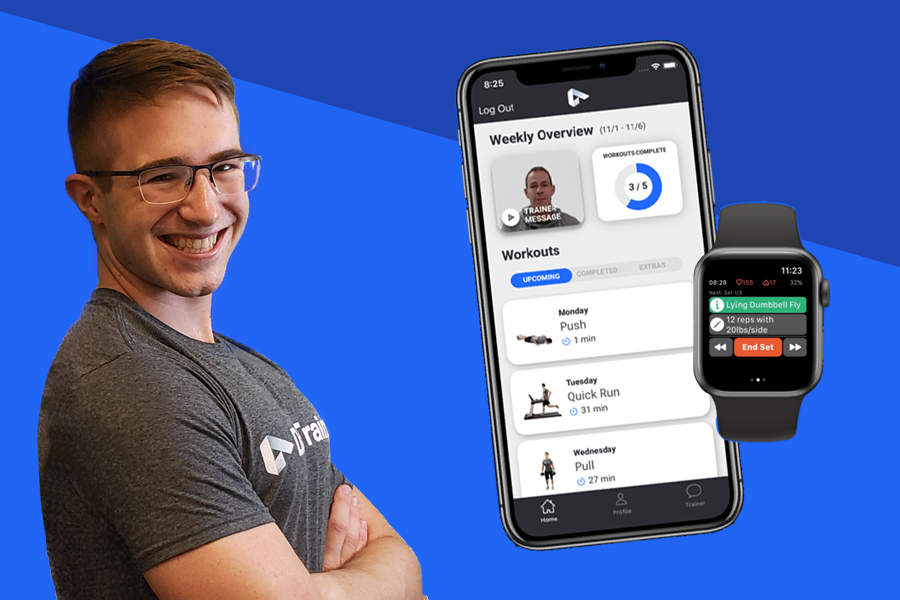
Change Maker
Alumnus Matt Spettel’s startup DeltaTrainer uses AI to achieve real fitness results
By Kristy Locklin
Matt Spettel’s been building and selling electronic devices and software since he was a kid.
In 2019, while still an undergraduate student in Carnegie Mellon University’s College of Engineering, he and his friend Gabe Madonna built DeltaTrainer, a fitness technology startup that just partnered with Anytime Fitness, the largest gym chain in the world.
It’s safe to say they’re pumped.
“Delta means change,” says Matt, who majored in electrical and computer engineering and graduated in 2019. “That was one of the core things we wanted to inspire. It’s not about flashy technology and celebrity endorsements; it’s about changing yourself and your fitness routine.”
DeltaTrainer pairs clients with a remote, one-on-one coach who develops personalized workout programs and holds them accountable. Everyone who signs up for the app can purchase an Apple Watch, which contains two sensors that — with help from DeltaTrainer’s software — can detect more than 500 exercises. DeltaTrainer’s artificial intelligence detects when specific exercises are executed and provides live feedback to clients on their form and pacing.
“Delta means change. That was one of the core things we wanted to inspire. It’s not about flashy technology and celebrity endorsements; it’s about changing yourself and your fitness routine.”
While a traditional trainer could cost you several thousands of dollars a year, the virtual counterpart is $69 a month.
Matt, a New Hampshire native, admits he wasn’t always an athletic guy.
While attending an engineering summer camp during his junior year of high school, he met Gabe, a state champion decathlete who went on to study machine learning at the Massachusetts Institute of Technology. The brainy bodybuilder got Matt on a workout regimen. The gym rats soon became best friends.
The pair noticed that while there were plenty of wearable cardio devices that counted steps, distance and heart rate, the fitness market was lacking technology that tracked strength training. With guidance from CMU’s Swartz Center for Entrepreneurship, they created DeltaTrainer.
“At CMU, I learned how to think about computers and operating systems in a deep way,” Matt says. “The Swartz Center was an invaluable resource, providing hundreds of hours of free mentorship time with entrepreneurs. I was able to pick their brains and assimilate their knowledge into my head as a business leader.”
A year after the launch of DeltaTrainer, the Pittsburgh-based business has 11 personal trainers on staff and thousands of clients sweating it out across the globe.
In February, DeltaTrainer teamed up with Anytime Fitness, which has 4 million active members and 4,500 locations worldwide, including one in Antarctica. The company also caters to smaller gym chains to help them stay competitive in the digitally dominated wellness industry.
Folks sign up online and are paired with a trainer based on goals and experience level. After a face-to-face video consultation with a movement motivator, they’re off and running, lifting or squatting. Clients message their trainer each day, and check in via video call twice a month.
“At CMU, I learned how to think about computers and operating systems in a deep way. The Swartz Center was an invaluable resource, providing hundreds of hours of free mentorship time with entrepreneurs.”
Matt says DeltaTrainer takes the mental gymnastics out of planning a workout. The convenience is key; especially during a pandemic when most people are exercising at home with limited resources.
A client can reach out to their coach and say, “I only have 35 minutes and a 20-pound dumbbell. How can I make the most of it?”
Once the plan is set, the app can tell if someone is executing a particular exercise properly. If you skimp on squats, your watch will speak up. For extra motivation, clients also can compete against family and friends for points in app leaderboards.
Matt and Gabe plan to add nutritional support services to the app with licensed dietitians providing guidance. They also have their sights set on a physical therapy component to DeltaTrainer with a long-term goal of providing clients with medical expertise from doctors.
Providing an affordable, holistic approach to wellness through technology is the biggest flex on folks who say they don’t have the time or money to get in shape.
Matt is happy DeltaTrainer makes people realize that getting into shape isn’t an exercise in futility.